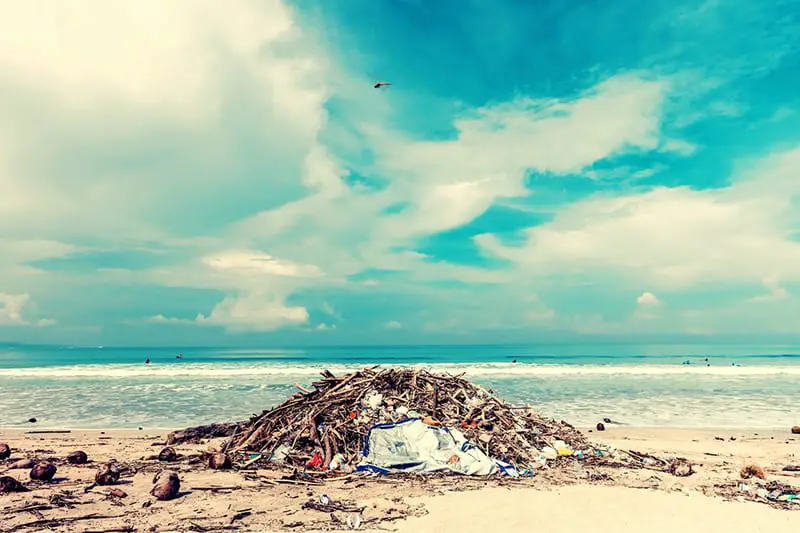Click here to get this post in PDF

Now that narratives such as climate change have become harder to dismiss, many of us are more aware of how human activity impacts the environment than ever before. This gradual surge in awareness has targeted all aspects of life with an amplified call for changes in behaviour. Even the smallest aspects of our daily routines can be deemed harmful to the environment.
The sanitary sector is certainly not exempt from this and many women may take the creation and disposal of these products for granted. However, these products can be a huge contributor to environmental damage. The Women’s Environmental Network has found that, on average, a woman will use more than 11,000 disposable menstrual products over her lifetime, which produces a staggering amount of waste. While periods are a reality that we cannot avoid, could we be managing the associated waste in a cleaner, eco-friendlier way?
Periods and the environment
Most of us will be poised and ready to manage our period with our trusted and essential sanitary products. However, the plastic content in many of the sanitary products that we rely on is having a detrimental effect on the environment.
Firstly, let’s consider what the carbon footprint of a person’s menstrual cycle looks like. A carbon footprint refers to the amount of carbon dioxide released into the atmosphere as a result of human activities. The idea of a ‘menstrual carbon footprint’ might seem strange but the way we manage our monthly cycle can directly impact our climate. Friends of the Earth established that one year’s worth of single-use sanitary products amounted to the equivalent of 5.3kg of carbon dioxide produced. This is because some tampons contain small amounts of dioxin, a by-product of the creation of the synthetic carbon fibre rayon.
Secondly, there’s the matter of plastic. Research has revealed that some sanitary towels have up to 90% plastic content. Despite society recognising the harmful qualities of single-use plastics, sanitary towels haven’t received the same scale of public attention as single-use straws, drinks stirrers and cotton buds. These other items are all set to be banned in 2020 in a bid to clean up our oceans but findings from the Marine Conservation Society revealed that for every 100m of beach cleaned, there is an average of 4.8 pieces of menstrual waste found. This amounts to four panty-liners, pads, backing strips, plus at least one tampon and an applicator.
When it comes to tampons, 6% of the average tampon is made up of plastic. Non-applicator tampons can be an easy way to make a greener choice as they contain 97% less plastic than their plastic applicator alternatives. So, if buying green is accessible enough, what about disposal through recycling? While the emphasis has always been placed on recycling, unfortunately, sanitary products cannot fall under this practice as they are used to collect human waste.
How can we improve our sanitary waste management habits?
First and foremost, we all need to become ‘binners’. Not flushing tampons down the toilet might seem like an unspoken rule but the consequences of being a ‘flusher’ rather than a ‘binner’ aren’t as widely known as you might think.
Flushing a tampon down the toilet can result in blockages further down the sewer system. It also contributes to the ‘fatberg’ epidemic which is growing in our sub-street level waterways. This is where fat, oil and single-use products such as sanitary items and face wipes have accumulated to form huge masses. One was recently discovered in Sidmouth, Devon, which equalled the length of six double decker buses.
So, becoming a ‘binner’ is one of the smallest yet most significant steps that we can take to reduce the environmental impact of sanitary products such as absorbent maternity pads. The Journal of The Institution of Environmental Sciences found that around 2.5 million tampons, 1.4 million sanitary liners, and 700,000 panty liners are flushed down UK toilets every day.
In terms of choosing eco-friendlier products, switching to organic tampons can be beneficial as the cotton used is free from pesticides, omitting any potential ecological effects. In turn, the growth of organic cotton can also help to lessen the development of climate change as the farming practices lock carbon dioxide into the soil. If you are committed to becoming more environmentally conscious, then consider changing your conventional tampon for an organic alternative.
Alternatively, if you are still using applicator tampons, you could swap to cardboard applicator or non-applicator products. Lil-Lets range of non-applicator tampons have an absorbent core made using viscose, which means no unnecessary plastic.
A sense of openness from sanitary brands is a key facilitator for allowing consumers to align their choices with environmental concerns and this certainly needs to be communicated on a large scale to provoke change. Groups such as The Women’s Environmental Network are leading the way in promoting their #PeriodsWithoutPlastic movement, educating and sharing ideas on how we can tackle the issue of the sanitary sector’s role in ecological damage.
Action is needed in terms of disposing of our sanitary waste. We must all commit to making small changes and substitutions to our own period routine. This could be by stocking up on non-applicator or organic products and by binning rather than flushing our pads and tampons!
You may also like: Are Employers Period-Savvy Enough?
Sources:
https://www.wen.org.uk/environmenstrual-campaign
https://friendsoftheearth.uk/plastics/plastic-periods-menstrual-products-and-plastic-pollution
https://lil-lets.com/uk/period-plastic
https://friendsoftheearth.uk/plastics/plastic-periods-menstrual-products-and-plastic-pollution
https://news.sky.com/story/plastic-straws-stirrers-and-cotton-buds-to-be-banned-in-england-11725704
https://www.shethinx.com/blogs/womens-health/life-cycle-of-tampon-biodegradable-period-products
